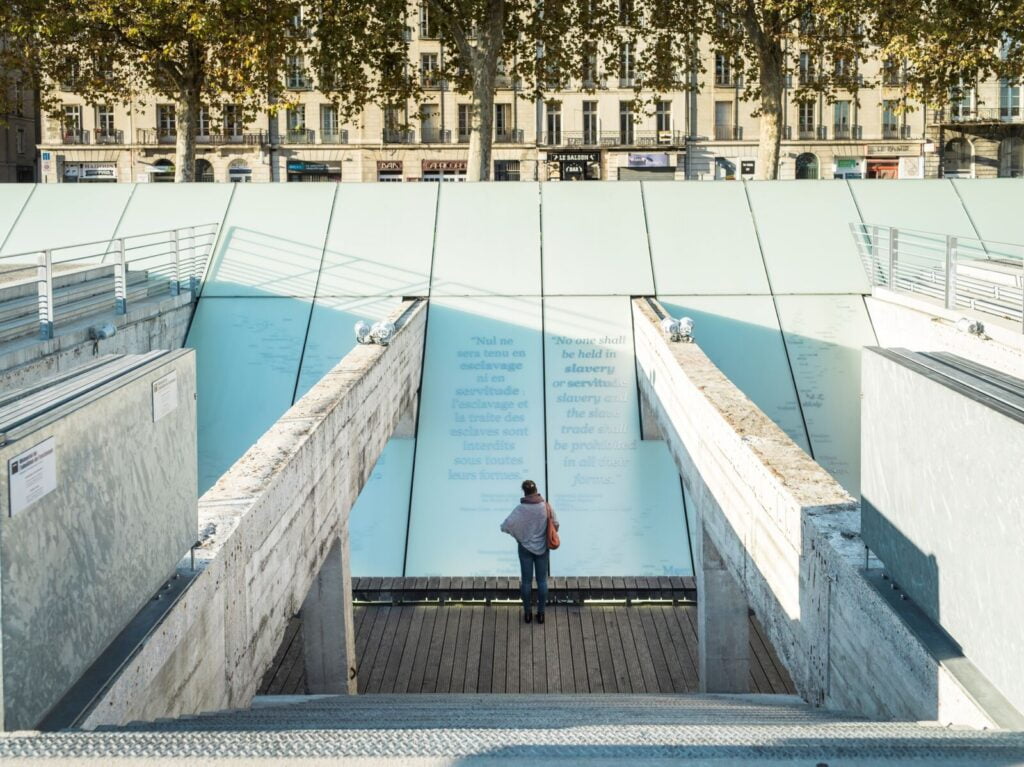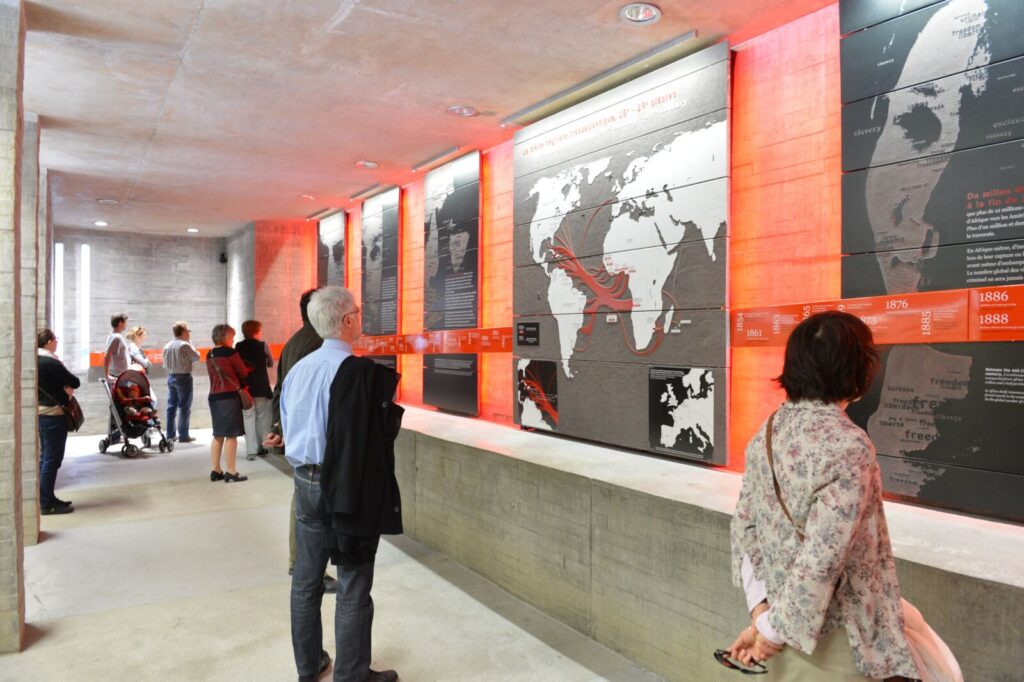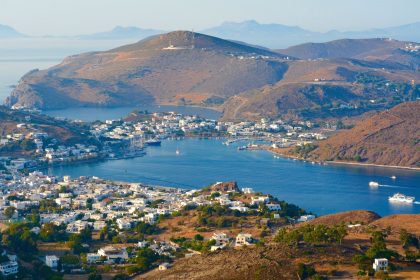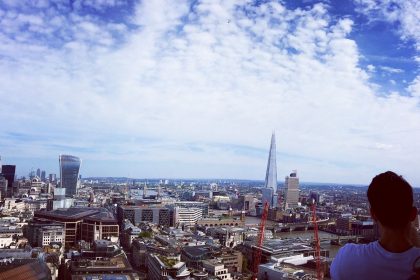“I am not truly free if I am taking away someone else’s freedom, just as surely as I am not free when my freedom is taken from me. The oppressed and the oppressor alike are robbed of their humanity.”
— Nelson Mandela, “Long Walk to Freedom”, 1994 (South Africa)
It’s fitting that Nelson Mandela’s quote is one of several that adorn the walls of the Memorial of the Abolition of Slavery in Nantes. Having served 27 years in prison, the anti-apartheid revolutionary and former president of South Africa knew a thing or two about oppression.
Inaugurated in 2012, the Memorial of the Abolition of Slavery is the culmination of an effort of nearly 25 years by the City of Nantes to face its history and address slavery. From the mid-17th century to the mid-19th century, France organized at least 4,220 slave trade expeditions, a large proportion of them by ship owners in Nantes. The port of Nantes was responsible for43 percent of the French slave trade, roughly 5 to 6 percent of the European Atlantic trade.
Created by visual artist Krzysztof Wodiczko and architect Julian Bonder, the goal was to build “a metaphorical and emotional reminder of the primarily historical, but also very current, struggle for the abolition of slavery.”
The attraction carries a triple message. It’s a tribute to all those who have risen up and fought against slavery, an invitation to reflect upon these crimes, and it is a call to continue fighting all forms of human exploitation in the world. The purpose is not to explain history but to act as a reminder to serve as a point of reference in building a collective awareness that refuses any form of enslavement and asserting the richness of human diversity.
“The design of the Memorial thus offers a dual perspective. On one side it is turned towards a town located on the banks of the Loire estuary, in a significant location, supported as it were, by huge quays which are interrupted in places where the river has been filled,” said Wodiczko and Bonder in a statement. “On the other side it is linked to the sea, the vehicle of the transatlantic triangular trade that made the city prosperous. The major feature of the geographic location of Nantes is the almost intimate contact with the Loire and, from there, across the Atlantic. The tides of the estuary provide an additional dynamic.”
One touching feature visitors will appreciate is the Meditative Tour. A broad, open-air staircase leads visitors from the esplanade to the underground passage, where they are welcomed by the Universal Declaration of Human Rights, behind which the word “Freedom” appears in 47 languages from countries that suffered from the slave trade.
For anyone interested in learning more about Black history, the Memorial of the Abolition of Slavery must be added to your list. As Mandela said, “Education is the most powerful weapon which you can use to change the world.”

The Memorial was constructed in 2012 as a tribute to all those who fought, who now fight, and who will continue the fight against slavery. At top, visitors learn about the role slavery played in Nantes. (Photos courtesy of Franck Tomps LVAN)
“For centuries this country repeated that we are brute beasts; that the human heartbeat stops at the gates of the black world; that we are walking manure hideously proffering the promise of tender cane and silky cotton, and they branded us with red-hot irons and we slept in our shit and we were sold in public squares and a yard of English cloth and salted Irish meat were cheaper than us and this country was quiet, calm, saying that the spirit of God was in his acts. …
I hear rising from the hold chained curses, gasps of the dying, the sound of one who is thrown into the sea … the baying of a woman giving birth… the scrape of fingernails advancing on throats … the sneer of the whip … the prying of vermin among weary bodies …”
— Aimé Césaire, Return to My Native Land, 1939 (Martinique, Antilles)

A broad, open-air staircase leads visitors from the esplanade to the underground passage, where they are welcomed by the Universal Declaration of Human Rights. (Photo courtesy of Franck Tomps LVAN)
“No one shall be held in slavery or servitude; slavery and the slave trade shall be prohibited in all their forms.”
— Universal Declaration of Human Rights, Article 4, United Nations, 10 December 1948

The Nantes Commemorative Trail features 2,000 glass plaques, with some serving as a reminder of the 1,710 slave trade shipments. (Photo courtesy of Jean-Dominique Billaud – Nautilus_LVANParcours)
“If, as the settlers say, we cannot cultivate the Antilles without slaves, then we must give up the Antilles. Justifying servitude in order to preserve the colonies is the politics of a brigand. A crime must not be a necessity. Let our colonies die, not our principles.”
— Victor Schœlcher, Des colonies française, 1842 (France)

The Memorial to the Abolition of Slavery opened to the public on March 25, 2012. It is located on the Quai de la Fosse, the symbolic departure point of many slave ships that sailed towards Africa. (Photo courtesy of Jean-Dominique Billaud – Nautilus_LVANParcours)
“Article 1: The French Republic recognizes that the transatlantic slave trade, as well as the slave trade in the Indian Ocean, on the one hand, and slavery, on the other, that began in the 15th century in the Americas and Caribbean, in the Indian Ocean and in Europe against the African, Amerindian, Malagasy and Indian populations, constitute a crime against humanity.”
— Discussion and adoption of the law on May 10, 2001 (France)
MORE ABOUT MEMORIAL OF THE ABOLITION OF SLAVERY
Website: memorial.nantes.fr/en/
Address: Passerelle Victor-Schoelcher, Quai de la Fosse, Nantes, France (see map below)
Nantes Tourism: www.nantes-tourisme.com/en
Explore France: https://ca.france.fr/en




